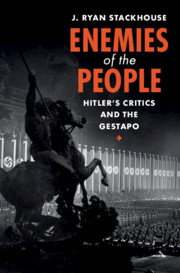Book contents
- Enemies of the People
- Enemies of the People
- Copyright page
- Dedication
- Contents
- Figures
- Tables
- Preface
- Acknowledgements
- Introduction
- 1 National and Regional Foundations, 1933–1945
- 2 Criminalizing Conversation, 1933–1934
- 3 Defining Opposition, 1935–1939
- 4 Discovering Offences, 1935–1943
- 5 Confirming Culpability, 1935–1943
- 6 Cooperation and Ascendancy, 1935–1939
- 7 Principles of Internal Security, 1939–1942
- 8 Enforcing People’s Community, 1939–1942
- 9 Total War Policing, 1943–1944
- 10 Involving the Party, 1943–1944
- 11 Death Throes, 1944–1945
- Epilogue
- Notes
- Bibliography
- Index
4 - Discovering Offences, 1935–1943
Published online by Cambridge University Press: 08 October 2021
- Enemies of the People
- Enemies of the People
- Copyright page
- Dedication
- Contents
- Figures
- Tables
- Preface
- Acknowledgements
- Introduction
- 1 National and Regional Foundations, 1933–1945
- 2 Criminalizing Conversation, 1933–1934
- 3 Defining Opposition, 1935–1939
- 4 Discovering Offences, 1935–1943
- 5 Confirming Culpability, 1935–1943
- 6 Cooperation and Ascendancy, 1935–1939
- 7 Principles of Internal Security, 1939–1942
- 8 Enforcing People’s Community, 1939–1942
- 9 Total War Policing, 1943–1944
- 10 Involving the Party, 1943–1944
- 11 Death Throes, 1944–1945
- Epilogue
- Notes
- Bibliography
- Index
Summary
The means of detection determined investigation and interrogation practices. Conspiratorial networks and targeted minorities were vulnerable to surveillance and infiltration in ways that society was not. Distinct groups with organized structures could be mapped to uncover organized resistance. Policing criticism was sisyphean by comparison. Blanket surveillance was neither realistic nor desirable. Practically, general suspicion threatened popular support. Ideologically, the police were to cooperate with racial comrades. Faced with limited resources and an impossible task, the Gestapo relied on Germans to denounce opponents in their midst. The Party played an integral role to this end. On the one hand, it screened accusations and channeled reports to the Gestapo. On the other, its officials reported a fifth of critics and encouraged others to do the same. These intermediaries dismissed minor offences, yet the Gestapo ultimately relied on denouncers with mixed motives. Highly questionable evidence documented potentially serious incidents. The Gestapo investigated critics thoroughly and cautiously as a result.
Keywords
- Type
- Chapter
- Information
- Enemies of the PeopleHitler's Critics and the Gestapo, pp. 92 - 117Publisher: Cambridge University PressPrint publication year: 2021

